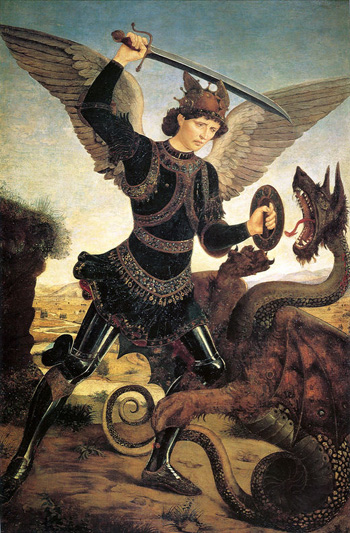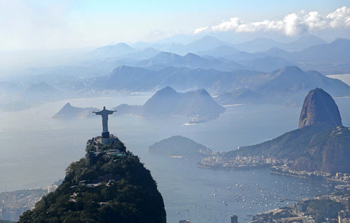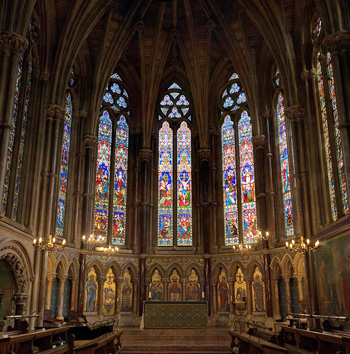Catholic Virtues
 |
 |
 |
 |
 |
 |
 |
True & False Paths to Happiness - XIV
Secular Relativism Destroys
the Opposition between Good & Evil
“How the gold has lost its luster, the fine gold become dull!” (Lamentations of Jeremiah, 4:1) The situation of relativism in which today’s world is immersed has long been discernible and has shocked upright souls.
Such souls have a strong sense of the contrast between good and evil. Today, integrating good and evil into a kind of mush, as secularism does, is seen as a manifestation of wisdom. It is as if a conglomeration of ground coconut, peanuts, almonds and cashews were all mixed together resulting in a mush so homogeneous that it became a single substance, abolishing all the differences between good and evil, truth and error, personal and national characteristics.
This is an image that describes secular relativism quite well!
Trying to maintain the distinction between good and evil has become objectionable. There is even a kind of reproach made against anyone who calls good, good, and evil, evil and sees them in a fight against each other.
 “You are a Manichaean,” they say. Supreme horror! This is meant to instantly silence the offender. The qualification Manichean has some electricity that seems to strike the person so labeled and immobilize him. [Manichaeism maintains that the Universe was created by two antagonistic and irreducible principles: the absolute good – the “good god”- and the absolute evil – the “evil god”]
“You are a Manichaean,” they say. Supreme horror! This is meant to instantly silence the offender. The qualification Manichean has some electricity that seems to strike the person so labeled and immobilize him. [Manichaeism maintains that the Universe was created by two antagonistic and irreducible principles: the absolute good – the “good god”- and the absolute evil – the “evil god”]
Now, since the beginning of time, differentiating good from evil has always been considered a necessity. This was true long before Mani, who gave rise to Manichaeism in the 3rd century. It is a precept of Natural Law, it was consigned by God in the Decalogue, it ran through the entire Old Testament, it was the object of the divine preaching of Our Lord Jesus Christ, and it is part of the doctrinal and moral patrimony of the Holy Catholic Church.
Denying the opposition between good and evil is, in a way, the summit of immorality, because it constitutes the essence of moral relativism, which is indeed a real danger. It speaks of a lack of definition, of consistency, of direction.
Sacred Scripture often speaks of this opposition: ”Good is set against evil, and life against death; so also is the righteous man set against the sinner. So, look upon all the works of the Most High, and there are two and two, one against another.” (Eccles 33:14-15)
Two opposing trilogies
Having a strong sense of the contrast between good and evil, however, is not enough. For evil is a close relative of ugliness and error. They are connected concepts, Siamese brothers, so to speak.
 In reality, there are two trilogies that oppose each other, since, at the opposite extreme, the good also forms a group with the true and the beauty. We, thus, have two trilogies:
In reality, there are two trilogies that oppose each other, since, at the opposite extreme, the good also forms a group with the true and the beauty. We, thus, have two trilogies:
Thus, for example, the edifice of a church, which in principle puts in practice the good and teaches what is true, should always be distinguished for its beauty. And it is highly advisable to have that form of beauty defined by dignity in a tribunal where justice is distributed.
On the extreme opposite, the representation of the Devil as being horrible and repellent corresponds well with his evilness and falsehood. He is bad and wrong; therefore, ugly.
A vile, gray environment without beauty favors Atheism because there is a kind of solidarity between ugliness and error. Ugliness is even a way of implying that God does not exist.
A notable example of this affirmation is all the artistic forms of Communism; they are a denial of all beauty, all good taste and all sacrality.
In our days the sense of good and evil has become blurred, as has the sense of opposition between beauty and ugliness, between truth and error. A “grand mush” has been made. And this mush favors secularism, which tries to drive away the beauty of life and lock it in specialized ambiences.
One of the capital sins of the 20th century is to deny the whole phenomenon of beauty or to interpret in a wrong way. It follows that secular cultures are fundamentally boorish and vulgar. This is because they tend only to the practical.
 The designs of God for man were quite different.
The designs of God for man were quite different.
God wanted to provide for the good of man by giving him abundant means to always bear in mind His infinite perfections.
In Guanabara Bay, in the mountains of Tyrol or in the square of a beautiful city, it is easier for man to discern the infinite perfections of God. It is the contribution of beauty, albeit in a small degree, to the Catholic sense of life.
On the contrary, in the infernal urban traffic, amidst the shocking pollution of the big cities today, it is difficult to always keep in mind the infinite perfections of God.
Secularism & sacralization: Two opposing goals
Secularism has two gamuts: One is to strip from every sphere of life all aspects of beauty that, in final analysis, are similar to God. The other is to strive for man to not see God in the beautiful. Such a person looks at a beautiful cathedral but see nothing but a building, a construction. Someone who has not been infected by secularism looks at the same cathedral, but his attitude is different: He admires, he contemplates.
 There are, therefore, two conceptions that oppose each other:
There are, therefore, two conceptions that oppose each other:
Since secularization properly signifies paganization, we must tend, each and every soul, to the second conception, that is, to the values of the spirit. And so we oppose secularism and identify ourselves with the ideal of the sacrality of the world.
Continued

Such souls have a strong sense of the contrast between good and evil. Today, integrating good and evil into a kind of mush, as secularism does, is seen as a manifestation of wisdom. It is as if a conglomeration of ground coconut, peanuts, almonds and cashews were all mixed together resulting in a mush so homogeneous that it became a single substance, abolishing all the differences between good and evil, truth and error, personal and national characteristics.
This is an image that describes secular relativism quite well!
Trying to maintain the distinction between good and evil has become objectionable. There is even a kind of reproach made against anyone who calls good, good, and evil, evil and sees them in a fight against each other.

The Catholic Church teaches that evil entered Creation with the Devil's fall & Original Sin
Now, since the beginning of time, differentiating good from evil has always been considered a necessity. This was true long before Mani, who gave rise to Manichaeism in the 3rd century. It is a precept of Natural Law, it was consigned by God in the Decalogue, it ran through the entire Old Testament, it was the object of the divine preaching of Our Lord Jesus Christ, and it is part of the doctrinal and moral patrimony of the Holy Catholic Church.
Denying the opposition between good and evil is, in a way, the summit of immorality, because it constitutes the essence of moral relativism, which is indeed a real danger. It speaks of a lack of definition, of consistency, of direction.
Sacred Scripture often speaks of this opposition: ”Good is set against evil, and life against death; so also is the righteous man set against the sinner. So, look upon all the works of the Most High, and there are two and two, one against another.” (Eccles 33:14-15)
Two opposing trilogies
Having a strong sense of the contrast between good and evil, however, is not enough. For evil is a close relative of ugliness and error. They are connected concepts, Siamese brothers, so to speak.

Modern architecture is related to error & immorality; it leads to Atheism
- On one side: the true, the good, the beauty;
- On the other extreme: the error, the evil, the ugliness.
Thus, for example, the edifice of a church, which in principle puts in practice the good and teaches what is true, should always be distinguished for its beauty. And it is highly advisable to have that form of beauty defined by dignity in a tribunal where justice is distributed.
On the extreme opposite, the representation of the Devil as being horrible and repellent corresponds well with his evilness and falsehood. He is bad and wrong; therefore, ugly.
A vile, gray environment without beauty favors Atheism because there is a kind of solidarity between ugliness and error. Ugliness is even a way of implying that God does not exist.
A notable example of this affirmation is all the artistic forms of Communism; they are a denial of all beauty, all good taste and all sacrality.
In our days the sense of good and evil has become blurred, as has the sense of opposition between beauty and ugliness, between truth and error. A “grand mush” has been made. And this mush favors secularism, which tries to drive away the beauty of life and lock it in specialized ambiences.
One of the capital sins of the 20th century is to deny the whole phenomenon of beauty or to interpret in a wrong way. It follows that secular cultures are fundamentally boorish and vulgar. This is because they tend only to the practical.

The beauty of Guanabara Bay invites us to contemplate God's perfections
God wanted to provide for the good of man by giving him abundant means to always bear in mind His infinite perfections.
In Guanabara Bay, in the mountains of Tyrol or in the square of a beautiful city, it is easier for man to discern the infinite perfections of God. It is the contribution of beauty, albeit in a small degree, to the Catholic sense of life.
On the contrary, in the infernal urban traffic, amidst the shocking pollution of the big cities today, it is difficult to always keep in mind the infinite perfections of God.
Secularism & sacralization: Two opposing goals
Secularism has two gamuts: One is to strip from every sphere of life all aspects of beauty that, in final analysis, are similar to God. The other is to strive for man to not see God in the beautiful. Such a person looks at a beautiful cathedral but see nothing but a building, a construction. Someone who has not been infected by secularism looks at the same cathedral, but his attitude is different: He admires, he contemplates.

Before a beautiful church the secularized man does not see its sacrality – above, Sainte Chapelle in Paris
- Persons who have been conquered by secularism want everything to be conceived as disconnected from religion, as having its own reality that has nothing to do with God. Religion either does not exist for them or is confined to just one of the thousand compartments of human thought.
- Other persons are very sensitive to the idea that everything, even those things furthest removed from ecclesiastical ambiences, must have a sacral note , that is, a religious note at depth since God was the Creator of all things. These persons are open to the ideal of the sacrality of the world.
Since secularization properly signifies paganization, we must tend, each and every soul, to the second conception, that is, to the values of the spirit. And so we oppose secularism and identify ourselves with the ideal of the sacrality of the world.
Continued

Posted July 27, 2020





